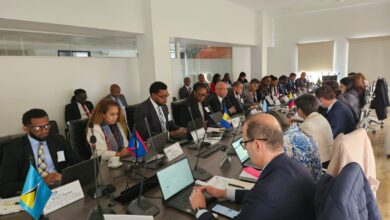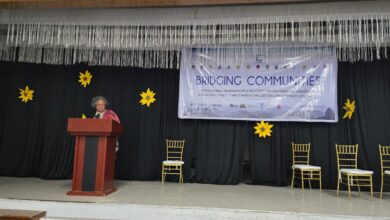(CARICOM Secretariat, Turkeyen, Greater Georgetown, Guyana) Heads of Government of the Caribbean Community (CARICOM) and Cuba called upon developed countries to contribute new and additional financial resources to implement measures aimed at adaptation to climate change and mitigation of greenhouse gases.
This was one of the clauses of the Declaration of Santiago de Cuba which was issued following the Third CARICOM-Cuba Summit which ended in that city on Monday 8 December.
The Declaration also called upon the international community to support through the establishment of an international financial framework, those countries that managed and preserved their forests in a sustainable way and also to support the inclusion in the post Kyoto agreement incentives for countries with standing rainforests in acknowledgement of their important role in mitigating the effects of climate change.
The leaders emphasised the need to invest in sustainable-renewable energy programs, and the infrastructure that would advance the objective of sustainable development of resources and contribute to Regional energy security.
Following is the full text of the Declaration:
Declaration of Santiago de Cuba
We, the Heads of State and/or Government of the Republic of Cuba and Member States of the Caribbean Community (CARICOM), comprising Antigua and Barbuda, the Commonwealth of The Bahamas, Barbados, Belize, the Commonwealth of Dominica, Grenada, the Cooperative Republic of Guyana, the Republic of Haiti, Jamaica, St. Kitts and Nevis, Saint Lucia, St. Vincent and the Grenadines, the Republic of Suriname and the Republic of Trinidad and Tobago;
Proud of our shared Caribbean identity and of the cultural wealth of our peoples;
Meeting for the third time at the Summit level, in Santiago de Cuba, Cuba, and commemorating the thirty sixth anniversary of the establishment of diplomatic relations between the independent Member States of the Caribbean Community and the Republic of Cuba;
Recalling the Declarations of Havana, 2002, and Bridgetown, 2005 and their importance, as well as their significant contribution to greater closeness between our nations;
Recalling further our firm commitment to the principles and purposes enshrined in the Charter of the United Nations, to multilateralism and to the fundamental principles of international law including respect for sovereignty and the sovereign equality of States, non-intervention and non-interference in domestic affairs, prohibition of the threat or the use of force in international relations, respect for territorial integrity, the peaceful settlement of disputes and our rejection of unilateral coercive measures geared at hindering the sovereign right of the citizens of every country to freely determine their political system and institutions, in peace, stability and justice;
Mindful of our commitment to the fundamental principles of human rights, dignity and freedom for all;
Mindful also of our commitments toward achieving the Millennium Development Goals (MDGs) in the areas of education, health, poverty alleviation and gender equality;
Deeply concerned by the deleterious impact of the present global economic and financial crisis particularly upon small developing countries which threatens to erode progress made toward the achievement of the Millennium Development Goals and the realisation of the United Nations Development Agenda;
Recognizing that small, vulnerable economies require special and differential treatment if they are to develop and become full participants in the international economy;
Mindful that cooperation, collaboration and solidarity are important to regional efforts to meet the challenges resulting from the present global economic and financial crises and from the unjust and inequitable international economic order prevailing to date;
Recalling our commitment to regional cooperation as an effective strategy toward realizing our goals for sustainable development, improved integration and the enhanced well-being of our peoples;
And Recognizing the benefits particularly in the areas of education and health realized from cooperation and exchange programmes between the Republic of Cuba and the Member States of the Caribbean Community;
We therefore:
1. Reaffirm the strong ties of brotherhood and solidarity between our nations.
2. Underscore that cooperation is an essential ingredient of regional integration in the Caribbean.
3. Express satisfaction at the demonstrations of solidarity and support among the countries of the Caribbean following upon the serious damage resulting from hurricanes and other natural phenomena impacting the region.
4. Emphasize the urgency of promoting global actions aimed at fostering the rational and sustainable use of natural resources, conserving and protecting the environment, and mitigating the effects of climate change on our countries and, in this context, reaffirm the principle of common but differential responsibility regarding the ecological debt and call upon developed countries to contribute new and additional financial resources required to implement measures aimed at adaptation to climate change and mitigation of greenhouse gases.
5. Call upon the international community to support, through the establishment of an international financial framework, those countries that manage and preserve their forests in a sustainable way.
6. Call upon the international community to support the inclusion in the post Kyoto agreement of incentives for countries with standing rainforests in acknowledgement of their important role in mitigating the effects of climate change.
7. Emphasize the need to invest in sustainable-renewable energy programs, and the infrastructure that would advance the objective of sustainable development of our resources and contribute to regional energy security.
8. Fully support the efforts being undertaken, through the Association of Caribbean States (ACS), in having the Caribbean Sea declared a ‘Special Area within the Context of Sustainable Development’ at the United Nations General Assembly in recognition of the importance of the Caribbean Sea as an area of unique bio-diversity, a highly fragile eco-system and an essential contributor to the livelihood of the peoples in the region.
9. Reiterate our serious concern about the passage of hazardous nuclear and other dangerous material through the Caribbean Sea and the serious threat of this high risk activity to the region’s safety and security and, in this regard, reaffirm our commitment to a nuclear-free Caribbean Sea.
10. Recognise the important results and social advances achieved in the region, especially in the fields of education and health, fruits of the programs of cooperation carried out among our nations particularly during the last six years.
11. Agree to continue and expand cooperative programmes between our nations in areas identified as priorities, and in accordance with the capacity and ability of each State.
12. Agree to place priority on promotion of health, human resources training, and disaster mitigation.
13. Underscore the need for fundamental reform of the international financial architecture through a more transparent and inclusive process under the aegis of the United Nations, providing for the participation of developing countries in decision making and in the creation of norms to govern international economic affairs.
14. Call for, in face of the crises caused by the policies followed by the industrialized countries, improved standards of regulation and supervision of international financial affairs so as to guard against future international financial and economic crisis.
15. Reiterate our dissatisfaction with the stalled negotiations of Doha Round and encourage Member States to resume good faith negotiations with a view to the creation of an effective multilateral trade system that is responsive to the needs and interests of small and vulnerable economies, including commitments to development assistance for the countries of our region.
16. Call for an end to the economic, commercial and financial embargo of the Republic of Cuba and urge the Government of the United States of America to heed the overwhelming call of the members of the United Nations and to lift with immediate effect the unjust economic, commercial and financial embargo imposed against the Republic of Cuba and cease the application of measures adopted as of 6 May 2004 to reinforce that policy.
17. Express our concern that in spite of our collective and individual efforts, the illicit traffic of narcotic drugs, psychotropic substances and small arms through the Caribbean, continues to grow resulting in increased criminality and social disintegration in our communities; and therefore renew our commitment to cooperate in the international struggle against these phenomena, in accordance with the principles adopted by the U.N. General Assembly and contained in the provisions of the international conventions and agreements to combat the traffic and abuse of illegal substances and the illicit trade in small arms.
18. Recall the Declaration against terrorism adopted in Bridgetown, Barbados, on December 8, 2005, during the Second Cuba-CARICOM Summit and, in that context, reaffirm our forceful and unequivocal condemnation of terrorism in all its forms and manifestations as well as to all acts, methods and practices of terrorism wherever they are committed, whoever perpetrates them, whatever the justification, and against whomever they are committed, including those in which States are directly or indirectly involved.
19. Reaffirm the importance of international cooperation in the struggle against terrorism in accordance with International Law and the Charter of the United Nations.
20. Reaffirm, our commitment to strengthen the existing institutions and mechanisms of regional integration, based on the principles of shared but differentiated responsibility.
21. Decide to actively work in favour of the present efforts of integration in Latin America and the Caribbean, so as to ensure appropriate recognition of the Caribbean within the context of Latin America and the Caribbean, and express our hope that the Latin American and Caribbean Summit on Integration and Development, to be held on December 16 and 17 in Salvador de Bahia, Brazil, will contribute to those efforts on the bases of the principles enshrined in International Law and the United Nations Charter, and of solidarity, cooperation and special and differentiated treatment for the more vulnerable economies in the region.
22. Recognize the achievements of Cuba in its capacity of President of the Movement of Non-Aligned Countries (NAM) in strengthening and revitalising the NAM.
23. Call for the international community to reaffirm its support for efforts to protect the economic, social and cultural rights of all, including the right to development, and in support of efforts to achieve civil and political rights, as well as achieve a greater balance between the promotion and protection of both these types of rights.
24. Call upon the international community to reaffirm its commitment to the right of people to live in peace and security, respecting the right of self-determination.
25. Decide to hold the Fourth Cuba-CARICOM Summit on December 8, 2011, in the Republic of Trinidad and Tobago; and Third Meeting of Ministers of Foreign Affairs in Havana on 2010.
Santiago de Cuba,
December 8, 2008





